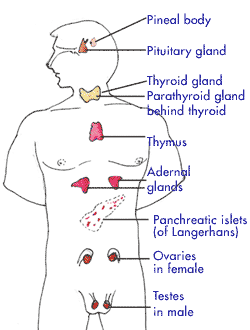
Similar to plants, certain special chemicals called hormones regulate
the various activities of our body. Hormones are chemical messengers,
which help in controlling and coordinating the activities of the body.
They are produced by endocrine glands. The hormone in other words acts
as a switch or a trigger for a certain action to take place.
Advertisement
The endocrine glands are under the control of the nervous system.
The endocrine system of human beings consists of the following glands:
Advertisement
1. Hypothalamus And Pituitary Gland
2. The Pineal Gland
3. The Thyroid Gland
4. The Parathyroid Glands
5. The Adrenal Glands
6. Islets Of Langerhans
Advertisement
(Pancreas)
7. Ovaries (Female)
8. Testes (Male)
|
Sl. No.
|
Endocrine Glands |
Location |
Hormone |
Action |
| 1 |
Pituitary (Master Gland) |
Base of fore brain, pea shaped |
Growth Hormone |
Regulates the growth of bone and
tissue. |
| |
|
|
Anti-diuretic hormone |
Controls amount of water reabsorbed by
the kidney |
| |
|
|
Adreno corticotrophic hormone |
Defending the body against
physiological stress eg. exposure to cold Follicle stimulating
hormone Stimulates ovary to produce female hormone |
| |
|
|
Thyroid stimulating hormone |
Stimulates thyroid to produce its
hormone |
| 2 |
Thyroid |
Neck of lower extremity of larynx,
butterfly shaped |
Thyroxine |
Regulates rate of growth and
metabolism. Too little over weight and sluggishness. Too much-
thinning and over activity. |
| 3 |
Adrenal |
A Pair of cap shaped organs above each
kidney |
Cortisone |
Aids in conversion of proteins to
sugar, cortex of this gland produces the hormone. |
| 4 |
Pancreas |
Itís a double gland |
Insulin |
Regulates Sugar metabolism. Too little
insulin leads to high sugar level in blood and weakness (a
condition called diabetes). |
| 5 |
Ovary |
Lie on the lateral walls of the pelvis |
Estrogen |
Development of Secondary sexual
characters. Eg. Development of breasts in female. |
| 6 |
Testis |
In the scrotum |
Testosterone |
Development of many masculine features
such as growth of moustaches and beard. |
